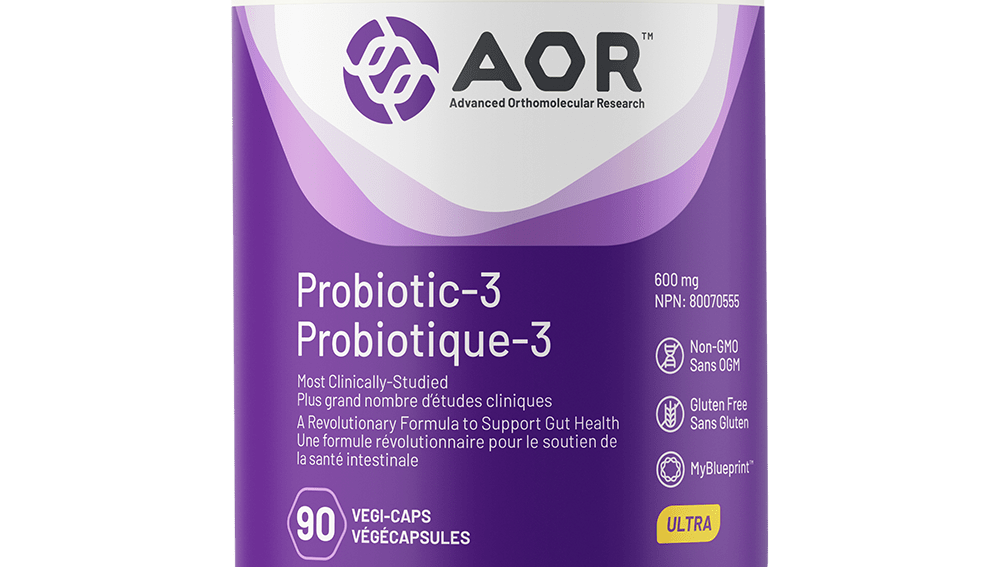Those who know me will know by now that I’m always intrigued by novel areas of scientific inquiry in the world of nutrition.
And so when Canadian supplement brand AOR (Advanced Orthomolecular Research) invited me to write an exploratory post on their novel probiotic blend – Probiotic-3 – I naturally jumped at the opportunity.
In today’s post, presented in collaboration with AOR, I honour my curiosity by taking a closer look at one of the three probiotic species present in their product – a formulation which has been used in Japan and across Asia for decades and is newer to the North American market.
There are three species of bacteria present:
- Subtilis & C. butryicum which are thought to offer a synergistic probiotic effect (more on this soon)
- faecium T-110 – which has prebiotic potential (supports the growth of other helpful bacteria)
Experimental evidence has suggested a potential role for this probiotic formulation in a number of gastrointestinal conditions including ulcerative colitis (1,2) , gastroenteritis caused by Salmonella , H.Pylori infection and acute infectious diarrhea.
Yet given how unique each bacterial species is as it relates to functionality and the health effects on the human body, I’ve chosen to focus on Clostridium Butryicum species of probiotic as a topic for further exploration in today’s post.
You can learn more about the product as a whole – and the research behind it – on the AOR Probiotic-3 product page.
The content of today’s post is an honest reflection of the studies I encountered when looking more closely into this specific species and given that gut health is a topic of such great curiosity to many of you.
I do hope you find the information to follow equal parts intriguing and insightful.
Let’s get to it.
An Introduction To Clostridium Butryicum
As its name does indeed infer, one of the most useful biological and biotechnological properties of C. butyricum bacteria is its proficiency at fermenting a wide range of carbohydrates and producing butyric acid as a byproduct.
Butyric acid is one of a group of compounds known as SCFAs or Short Chain Fatty Acids that are increasingly thought to have beneficial effects on gastrointestinal health, in part because they are an energy source for the cells within the colon (colonocytes).
Studies have shown that SCFAs like butryic acid and related compounds have beneficial immunomodulatory effects and may reduce inflammation in the GI tract.
In cultured cells from the digestive tract they have been shown to repress inflammatory signaling and pathogen growth, and they may also stimulate protective mucus production and improve muscle contraction in this region of the body.
They may also positively influence electrolyte and fluid balance, which taken together offers up partial if not compelling insight into why these compounds have been generated in the world of constipation and IBS management.
Certain strains of C. butyricum have also demonstrated a potential antibacterial effect against the common pathogenic bacteria E.coli.
Clostridium Butryicum, IBS-D & Ulcerative Colitis
Speaking of Irritable Bowl Syndrome, in 2018 a randomized double-blind controlled trial was published out of the Scientific Reports journal which looked at a C butryicum-based intervention on diarrhea-dominant IBS.
The study randomized 200 IBS-D sufferers across either control or C. Butryicum intervention in order to assess any potential benefits of this bacteria on quality of life in these individuals.
Statistically significant improvements were observed for overall symptoms, quality of life and bowel regularity in the group that received C. Butryicum offering some insight into the potential merit of this species in the world of IBS management.
Multiple experimental studies (1,2) have also identified that C. Butryicum is an effective complimentary management strategy for UC (ulcerative colitis), even in the absence of other probiotic species.
Before Using Probiotics
Consult a health care practitioner prior to use if you are pregnant or breastfeeding, if you have fever, vomiting, bloody diarrhea, or severe abdominal pain. Do not use if you have an immune compromised condition (e.g. AIDS, lymphoma, patients undergoing long-term corticosteroid treatment). If symptoms of digestive upset (e.g. diarrhea) occur, worsen, or persist beyond three days, discontinue use and consult a health care practitioner. This product contains lactose, dextrin, and potato starch, do not use if you have such allergies.
Andy De Santis RD MPH



